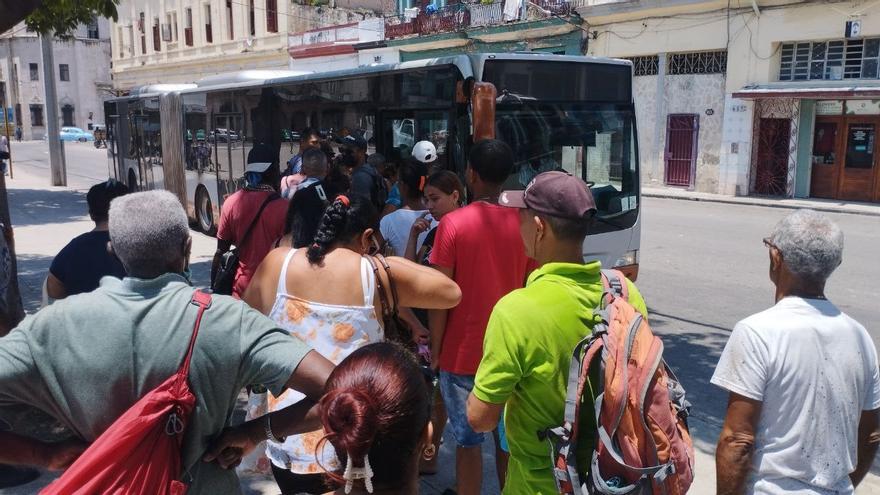
![]() 14ymedio, Madrid, 27 June 2023 — With the holidays just around the corner, the overall situation in passenger transport is bleak on the Island. The most serious thing, due to its repercussions on mortality, is the insecurity of the roads. According to the Minister of Transport, Eduardo Rodríguez Dávila, 40% have an unfavorable technical condition.
14ymedio, Madrid, 27 June 2023 — With the holidays just around the corner, the overall situation in passenger transport is bleak on the Island. The most serious thing, due to its repercussions on mortality, is the insecurity of the roads. According to the Minister of Transport, Eduardo Rodríguez Dávila, 40% have an unfavorable technical condition.
The bad news from the sector did not take anyone by surprise, despite the fact that the minister made an effort to show some achievements last year. Among them, the increase in the bus fleet in Havana, something that would not have been possible without the donation of 104 additional vehicles. Ten minibuses were also added, in this case thanks to the fall in tourism, which they served before. Other advances in 2022 were the increase in routes in the capital with 75 electric tricycles, the reestablishment of rail services and the MóvilWeb Urbanos application for transport, among other things.
But the assessment doesn’t leave a good taste in the mouth, since Rodríguez Dávila began by admitting that there is a “decrease in passenger and cargo transport capacities” and attributed the situation to objective and subjective factors.
The minister put the cost of keeping the fleet ready at 40 or 50 million dollars a year and, since there is no money, the availability of transport is only 50%, “aggravated by the fuel situation on the island.” Although the traffic in the ports indicates that oil is arriving, the needs are many, and public transport does not exactly seem to be the priority. According to the minister, in some provinces only “opening and closing” trips are made due to a shortage that he attributed, among other reasons, to the “persecution” of the ships that transport it, alluding to the US embargo.
Rodríguez Dávila insisted that the sector needs to have access to “freely convertible currency to guarantee fuel, spare parts and other logistical elements,” raising the shadow of the possibility of charging for transport in freely convertible currency (MLC).
At the moment, at least, it doesn’t seem to be the solution. The minister complained that the measure to ban cruises from the United States, taken by the Donald Trump Administration and not reversed by the Biden Administration, prevents a lot of foreign exchange from being captured in ports. Despite this, he explained that at the beginning of this year an MLC fund was created exclusively for the sector, which is formed “with income from abroad in the aviation and maritime-port systems.” With that money, he said, more than a thousand means of transport were recovered, since it was invested in buses.
The minister indicated that transport has “acceptable prices for the population,” although the data of the consumer price index (CPI) indicate that it is one of the sectors that has risen the most in the last year, more than 18% since last April. However, although for Cubans the cost is high, companies are in deficit or, in the words of Rodríguez Dávila, “they are below the threshold of the profitability of companies” and many of them “report losses.”
“The main transport bases throughout the country have been working practically without spare parts for the last three years,” he added.
The official also spoke about the railway, which is very deficient in terms of passenger transport, although it has been possible to move “prioritized” cargo as long as conditions have allowed it. With this, he refers to the almost 600,000 tons of fuel, sugar and products corresponding to the basic basket that move along the railways.
On the other hand, the transport of port cargo was reduced by 44% since 2018, but new means for its improvement have been incorporated, including small ships with 2,800 tons of capacity.
Among the positive points, valued by the minister, is the theoretical improvement of parcel shipping services, the legalization of new means of transport, such as electric tricycles that provide service on short routes between cities, and the creation of a public bicycle service.
“We are going to continue with that program,” he said, while threatening “more energetic measures with drivers and bosses who fail to comply with the support that state vehicles must give to passenger transport.”
Translated by Regina Anavy
____________
COLLABORATE WITH OUR WORK: The 14ymedio team is committed to practicing serious journalism that reflects Cuba’s reality in all its depth. Thank you for joining us on this long journey. We invite you to continue supporting us by becoming a member of 14ymedio now. Together we can continue transforming journalism in Cuba.
